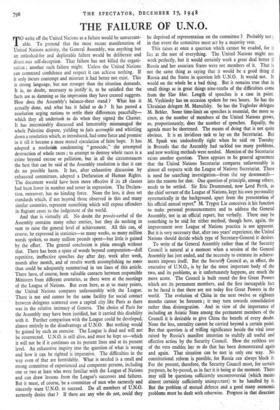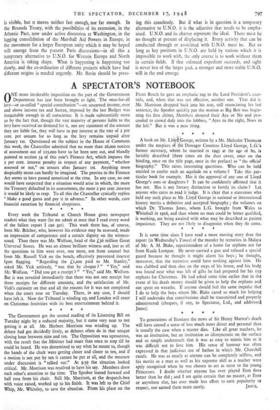THE FAILURE OF U.N.O.
TO write off the United Nations as a failure would be unwarrant- able. To pretend that the most recent manifestation of United Nations activity, the General Assembly, was anything but an unlooked-for and deplorable failure would be deliberate and disast.ous self-deception. That failure has not killed the organi- sation ; another such failure might. Unless the United Nations can command confidence and respect it can achieve nothing. If it only incurs contempt and mistrust it had better not exist. This is strong language, but not stronger than the situation demands. It is, no doubt, necessary to justify it, to be satisfied that the facts are as damning as the impression they have created suggests. How does the Assembly's balance-sheet stand ? What has it actually done, and what has it failed to do ? It has passed a resolution urging nations to settle their differences peacefully— which they all undertook to do when they signed the Charter. It has interminably discussed and lamentably mismanaged the whole Palestine dispute, yielding to faits accomplis and whittling down a resoluticn which, as introduced, had some force and promise in it till it became a mere muted ejaculation of faint hope. It has adopted a resolution condemning "genocide," the attempted destruction of whole races ; to attempt to destroy whole races is a crime beyond excuse or palliation, but in all the circumstances the best that can be said of the Assembly resolution is that it can do no possible harm. It has, after exhaustive discussion by exhausted committees, adopted a Declaration of Human Rights. The document would have been more effective if its 28 clauses had been fewer in number and terser in expression. The Declara- tion, moreover, has no binding force. None the less, it does set standards which, if not beyond those observed in this and many similar countries, represent something which will expose offenders in flagrant cases to the judgement of the world.
And that is virtually all. No doubt the proces-verbal of the Assembly contains many other entries, but they do nothing in sum to raise the general level of achievement. All this can, of course, be expressed in statistics—so many weeks, so many million words spoken, so many million pounds spent—but little is gained by the effort. The general conclusion is plain enough without that. There has been a spate of words beyond computation—dull repetitive, ineffective speeches day after day, week after week, month after month, and of results worth accomplishing no more than could be adequately summarised in ten lines of this article. There have, of course, been valuable contacts between responsible Ministers from different countries, as there were at the meetings of the League of Nations. But even here, as at so many points, the United Nations compares unfavourably with the League. There is not and cannot be the same facility for social contact between delegates scattered over a capital city like Paris as there was in the relative intimacy of Geneva. The choice of Paris for the Assembly may have been justified, but it carried this disability with it. Further comparison with the League could be developed, almost entirely to the disadvantage of U.N.O. But nothing would be gained by such an exercise. The League is dead and will not be resurrected. U.N.O. is still alive, and must be kept so—which it will not be if it continues on its present lines and at its present level. An exhaustive inquiry into the question of what is wrong and how it can be righted is imperative. The difficulties in the way even of that are formidable. What is needed is a small and strong committee of experienced and competent persons, including one or two at least who were familiar with the League of Nations and can draw lessons from the League's successes and failures. But it must, of course, be a committee of men who earnestly and sincerely want U.N.O. to succeed. Do all members of U.N.O. earnestly desire that ? If there are any who do not, could they be deprived of representation on the committee ? Probably not ; in that event the committee must act by a majority vote.
This raises at once a question which cannot be evaded, for it lies at the root of everything. The United Nations might not work perfectly, but it would certainly work a great deal better if Russia and her associate States were not members of it. That is not the same thing as saying that it would be a good thing if Russia and the States in question left U.N.O. It would not. It would on the whole be a bad thing. But it remains true that in small things as in great things nine-tenths of the difficulties come from the Slav bloc. Length of speeches is a case in point. M. Vyshinsky has on occasion spoken for two hours. So has the Ukrainian delegate M. Manuilsky. So has the Yugloslav delegate M. Bebler. Some time-limit on speeches is essential, the more so since, as the number of members of the United Nations grows, so, proportionately, does the number of speeches. Equally, the agenda must be shortened. The means of doing that is not quite obvious. It is an invidious task to lay on the Secretariat. But M. Spaak was undoubtedly right when he said on Tuesday in Brussels that the Assembly had tackled too many problems, and new working methods were needed. Mention of the Secretariat raises another question. There appears to be general agreement that the United Nations Secretariat compares unfavourably in almost all respects with the League of Nations Secretariat. There is need for searching investigation—from the top downwards— into the reasons for that. One question of principle, among others, needs to be settled. Sir Eric Drummond, now Lord Perth, as the chief servant of the League of Nations, kept his own personality systematically in the background, apart from the presentation of his official annual report.' M. Trygve Lie conceives it his function to make personal pronouncements and to address the General Assembly, not in an official report, but verbally. There may be something to be said for either method, though here, again, the improvement over League of Nations practice is not apparent. But it is very necessary that, after two years' experience, the United Nations should decide which type of Secretary-General it desires.
To write of the General Assembly rather than of the Security Council is natural at a moment when a session of the General Assembly has just ended, and the necessity to estimate its achieve- ments imposes itself. But the Securil Council as, in effect, the executive of U.N.O., is by far the more important body of the two, and its problems, as it unfortunately happens, are much The more acute. The Council is built round the five Great Powers which are its permanent members, and the first inescapable fact to be faced is that there are not today five Great Powers in the world. The evolution of China in the next twelve or eighteen months cannot be foreseen ; it may turn towards consolidation rather than disintegration. And in view of the importance of including an Asiatic State among the permanent members of the Council it is desirable to give China the benefit of every doubt. None the less, unreality cannot be carried beyond a certain point. But that question is of trifling significance beside the vital issue raised by Russia's manifest intention to stultify all useful and effective action by the Security Council. How the ruthless use of the veto enables her to do that has been demonstrated again and again. That situation can be met in only one way. No constitutional reform is possible, for Russia can always block it. For the present, therefore, the Security Council must, for certain purposes, be by-passed, as in fact it is being at the moment. There may still be questions sufficiently uncontroversial (which means almost certainly sufficiently unimportant) to be handled by it. But the problem of mutual defence and a good many economic problems must be dealt with otherwise. Progress in that direction is visible, but it moves neither fast enougbnor far enough. In the Brussels Treaty, with the possibilities of its extension, in the Atlantic Pact, now under active discussion at Washington, in the lagging consolidation of the Marshall Aid Powers in Europe, in the movement for a larger European unity which it may be hoped will emerge from the present Paris discussions—in all this a temporary alternative to U.N.O. for Westein Europe and North America is taking shape. What is happening is happening too slowly, and the co-ordination of different projects which have had different origins is needed urgently. Mr. Bevin should be press- ing this ceaselessly. But if what is in question is a temporary alternative to U.N.O. it is the adjective that needs to be empha- sised. U.N.O. and its charter represent the ideal. There must be no thought at present of displacing it. Every activity that can be conducted through or associated with U.N.O. must be. But so long as key positions in U.N.O. are held by nations which it is impossible to work with, the only course is to work without them in certain fields. If that enforced expedient succeeds, and sight is never lost of the larger goal, a stronger and more stable U.N.O. will in the end emerge.



































 Previous page
Previous page